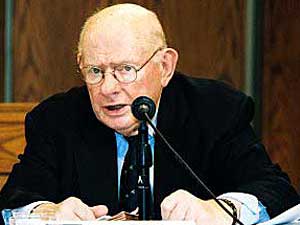|
Audio
Photos
Resources
|
September 27, 2005
A long-time federal appeals court judge is calling on the legal system to take a radical step against drug-related crime. Eighth Circuit Court of Appeals Judge Donald Lay says locking up drug addicts and dealers for longer and longer sentences hasn't worked. But federal prosecutors say Lay's idea is just too extreme.
St. Paul, Minn. — Donald Lay has served on the federal appeals bench for nearly 40 years; President Lyndon Johnson appointed him in 1966. Since then, Lay has upheld thousands of drug convictions if not more. But that didn't stop many of those offenders from repeating their crimes. Now, Lay who is approaching 80 years old says enough is enough; it’s time the federal courts try a different approach.
Lay wants to borrow an idea from state courts. State courts run specialized drug courts. These courts take people charged with drug crimes and divert them into treatment rather than going through a trial and possibly ending up in jail. Lay says the state courts have had success and it's time federal courts try the same idea.
"Even if we gave a large trafficker, one who's made a good deal of money on this, the opportunity to avoid prison, the opportunity to make his life a different way of living, we ought to try it,” says Lay.
What Judge lay wants to try is already happening in Hennepin County. On a recent day in the county's drug court, a man who has some mental problems and is addicted to marijuana stands before Hennepin County Judge Gary Larson. The man has smiling blue eyes and is in his 20's. Larson's seen him before. Weeks ago, when police arrested him on drug possession charges, he appeared before Larson. Then Larson chose to send him to treatment rather than jail. As part of the drug court system, the man must also submit to regular drug testing and meet with Larson after the results. Today, the results are bad.
"It's got to stop,” says Judge Larson. “We've gone long enough. I've been with you long enough now and tolerated it. And I'm not tolerating it anymore. You understand? (Yes) What's happening with the psychiatrist...?”
The judge gives the man another chance. He says a person can't break an addiction overnight. Larson says there have been successes in his courtroom like a drug-addicted woman whose case he monitored. After going through drug court she gave birth to a drug-free baby.
Nevertheless, some argue that it's not entirely proven that drug courts keep offenders from repeating their crimes. There are some who say state drug courts have an inherent conflict of interest. Critics say there's the potential that state drug courts are skewing their numbers to look better than they actually are in order to keep receiving federal funds.
Some prosecutors say Eight Circuit Court of Appeals Judge Donald Lay's idea to use the same kinds of courts in the federal system just would not work. U.S. Attorney Tom Heffelfinger opposes Lay's idea because of the serious damage drug crimes can cause not only to individuals but also to whole neighborhoods. He says the kinds of drug crimes in federal court are much more serious. They're not based on addiction.
"The vast majority of cases we take are drug dealers, business people; people who are violent drug offenders like gang members. Drug courts do not work for people whose primary motive is business, people who are violent offenders or who utilize weapons,” he says.
Some federal courts use drug courts but with a twist. In these courts, a person like the blue-eyed man in Hennepin County would go to prison. After he's released and on parole, he'd be eligible for treatment and counseling through drug court. If he failed, he'd go back to prison. If he succeeded, the judge would cut his time on parole, now known as supervised release.
Senior Federal Judge Charles Sifton runs one of those courts in New York. A federal judge for 28 years and a former prosecutor, Sifton says he was tired of seeing the same scenario play out. A drug offender gets out of prison and goes on supervised release. He or she tries to stay off drugs but has multiple relapses despite warnings from a probation officer.
"I would say, why didn't you we have some kind of proceeding where I could've seen what was happening so I don't come in at the end with no choice but to send the individual back to prison," he says.
Sifton says the difference now is that drug offenders go through treatment, submit to frequent drug testing and, most importantly he says, meet with judges -- one on one,” says Sifton.
"Some judges in my court have said, 'Wait a minute, we're not trained to deal with drug addiction.' And my response is, 'you’re absolutely right.' All I'm doing is trying to make the law realistic,'” he says.
Sifton says he's not asking federal judges to be counselors but to use the power of their positions to influence drug addicts to stay clean. He says addicts are less likely to fall through the cracks in the system because judges are tracking their progress; the same judges who sentenced them, know their records, and could send them right back to prison.
The court has had people with substantial drug problems make it through a year or longer of abstinence he says. Nevertheless, Sifton agrees with U.S. Attorney Tom Heffelfinger, that drug court should not divert an offender from prison completely. But Judge Donald Lay disagrees.
"I supposed some people would hear me and say, 'He's a soft-liner.' But under the present system, we're certainly not gaining on it so why not give it a try?'"
The number of state drug courts has soared in the last 15 years. In 1989, there was only a handful, now the White House says there are at least 1600.





